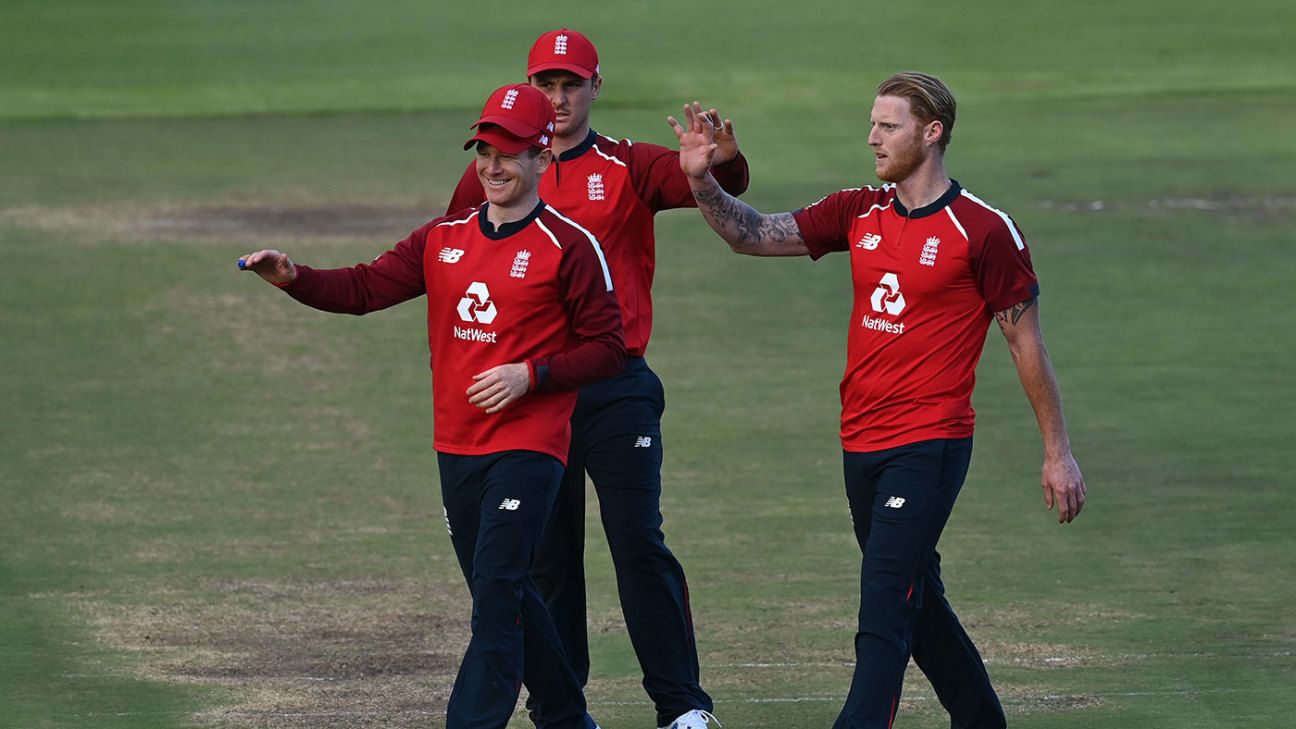
Lottery numbers, shoe sizes and dancing competition scorecards - England players and the ECB have been quick to make light of their use of coded signals sent from the dressing room to the field during their T20 series against South Africa.
England team analyst Nathan Leamon could be seen placing cards on the dressing room balcony showing a combination of numbers and letters during the third T20I at Newlands on Tuesday. England won the match by nine wickets after Dawid Malan's stunning 99 not out in a record 167-run partnership with Jos Buttler overhauled a huge target of 192.
Buttler, who scored an unbeaten on 67, joked after the game that the cards showed lottery numbers, before making a more serious comparison with tactical time-outs in the IPL.
"The lads were checking their Euromillions numbers," Buttler told Sky Sports with a smile. "Eoin [Morgan] works closely with Nathan to work on the match-ups. In the IPL, you have two tactical time-outs for suggestions from analysts, but you have to be careful how you use it, there has to be an instinctive, intuitive side to the game."
ALSO READ: Malan reaches 915 points, the highest ever for batsmen in T20I rankings
The ECB said the signalling system was being trialed and was "intended as a live informational resource that the captain may choose to use or ignore as he wishes". It added: "They are not commands or instructions and all decision-making takes place on the field."
The practice drew mention of South Africa's use of earpieces to relay messages from the dressing room to the field during their 1999 World Cup match against India. At the time, the ICC said using earpieces did not break any rules but deemed it unfair and subsequently banned the use of such devices.
It's not the first time that Leamon has used such methods to pass information from the boundary's edge. After teaming up with Andy Flower at Multan Sultans for this year's PSL, he set up a similar system with the on-field captain, Shan Masood - a practice which Flower later told ESPNcricinfo was about "maximising information".
"Match-ups over a shortened game are very important, and so is getting your field and your bowling tactics right," Flower said. "That sort of information would be covered pre-game, but that's a lot of information for a captain, and obviously he won't retain it all. [Favourable match-ups] would be an example: a gentle reminder of the flow of the game, the resources you have left in the attack, and just putting the right chess pieces in place at the right time."
There is no suggestion England's use of written codes breached any rules, although it did raise questions over whether it was ethical or in the spirit of the game. Mark Wood, the England quick, said the team had "cleared it with the match referee first".
"Maybe this is part of the new way of cricket," Wood said. "We're always looking for ways to improve so maybe this is it, the analyst gets a hold of a scorecard like [Strictly Come Dancing judge] Craig Revel Horwood and then we've got a got a new game show."
Speaking to the media via Zoom on Wednesday, Wood - who is hoping to feature in the three-match ODI series against South Africa starting at Newlands on Friday after being overlooked for the T20Is - played down the importance of the coded signals.
"I thought shoe sizes at one point," Wood said. "I think it wouldn't honestly bother me. Until this morning, I honestly didn't even know about it. That's how much notice I took.
"I think it's good for the captain to have. Morgy's a very instinctive captain anyway, so I'm not sure he needs that much but it's great to have the information there. Nathan does a good job. So any little bit can help, but I'm not sure I'll be taking that much notice of it, too busy worrying about other things."















 Phone: (800) 737. 6040
Phone: (800) 737. 6040 Fax: (800) 825 5558
Fax: (800) 825 5558 Website:
Website:  Email:
Email: 






